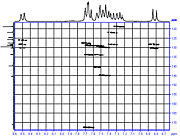2D HMBC
From NMR Wiki
| Line 1: | Line 1: | ||
[[Image:Sudan I HMBC.jpg|thumb|{{1H}},{{13C}}-HMBC spectrum of Sudan I dye]] | [[Image:Sudan I HMBC.jpg|thumb|{{1H}},{{13C}}-HMBC spectrum of Sudan I dye]] | ||
| - | '''2D [[HMBC]]''' (Heteronuclear Multiple Bond Correlation) experiment correlates chemical shifts of two types of nuclei separated from each other with two or more chemical bonds. For example {{1H}},{{13C}}-HMBC correlates chemical shifts of protons with carbons separated with two or three bonds, in some cases even the more distant ones. The zero and double quantum coherences with lowpass filtration for elimination of single quantum coherences are usually applied in this experiment. | + | '''2D [[HMBC]]''' (Heteronuclear Multiple Bond Correlation) experiment correlates chemical shifts of two types of nuclei separated from each other with two or more chemical bonds. For example {{1H}},{{13C}}-HMBC correlates chemical shifts of protons with carbons separated with two or three bonds, in some cases even with the more distant ones. The zero and double quantum coherences with lowpass filtration for elimination of the single quantum coherences are usually applied in this experiment. |
{{1H}},{{13C}}-HMBC is frequently used for assigning of quaternary and carbonyl carbons. | {{1H}},{{13C}}-HMBC is frequently used for assigning of quaternary and carbonyl carbons. | ||
Revision as of 14:00, 9 June 2010
2D HMBC (Heteronuclear Multiple Bond Correlation) experiment correlates chemical shifts of two types of nuclei separated from each other with two or more chemical bonds. For example 1H,13C-HMBC correlates chemical shifts of protons with carbons separated with two or three bonds, in some cases even with the more distant ones. The zero and double quantum coherences with lowpass filtration for elimination of the single quantum coherences are usually applied in this experiment.
1H,13C-HMBC is frequently used for assigning of quaternary and carbonyl carbons.
Chemical shift of one nucleus - usually 1H is detected in the directly measured dimension, while chemical shift of second nucleus (heteronucleus or X-nucleus) is recorded in the indirect dimension.


